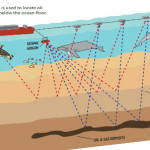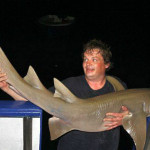The Ministry of Fisheries has deferred implementing a total ban on shark hunting, citing concerns over finding alternative livelihoods for shark fishermen.
In a press release issued on Monday, the Ministry said a total ban on shark hunting will come into effect but only after the cabinet discusses the issue in a meeting understood to take place next Tuesday.
The press release, at times confusing and poorly worded, also appears to imply that the shark hunting ban will not be enforced until all shark fishermen find alternative livelihoods.
Meanwhile environmentalists are disappointed at the Ministry’s failure to implement the promised shark-hunting ban on time.
On 1 March 2009, the Ministry of Fisheries announced a ban on hunting reef sharks in the Maldives. The 2009 ban did, however, permit the hunting of oceanic sharks 12 miles or more from the Maldivian coastline. The Ministry said they would impose a total ban on all shark hunting by 1 March 2010.
At the time, the ministry said it needed a year before introducing the total ban in order to facilitate alternative sources of income for shark fishermen.
“A year is a long time to prepare for a shark ban, but the Ministry has made no attempt to find alternatives for these fishermen” says Ali Rilwan, director of environmental NGO Bluepeace.
The delay
“If government does not have funds [to find fishermen new jobs], they could appeal directly to the beneficiaries, to those who love sharks. For a noble cause, a lot of people will contribute,” suggested Rilwan.
He says resorts, dive schools and well-wishers could help compensate and find alternative mechanisms for fishermen, adding that all stakeholders have to shoulder the responsibility.
Director General of Environmental Research Center, Dr Mohamed Shiham Adam, says the government still needs to consider the impacts of a total ban: “How many fishermen will be affected, and how much [fishing] gear will have to be thrown away?”
“It is a difficult time for the fishing industry. Fishermen are unable to pay back loans they have taken, and the industry is in such a dire condition that MPs have planned to give subsidies also,” Dr Shiham added.
Dr Shiham did say that the government was determined to implement the total ban.
“No matter what happens in the cabinet meeting, the government is steadfast in its intention,” he said.
Dr Shiham said that the government is working with private tuna export companies to increase job opportunities. He further noted that the government is offering loans for the development of small and medium sized enterprises for fishing and agriculture.
But independent experts are unimpressed with the Ministry’s progress over the past year.
“If we had done awareness programmes through the year, it would have been easier to implement the shark ban now,” said Marie Saleem, an environmental consultant who helped draw up the 2009 ban.
“The responsibility to find alternative income opportunities lies with both parties, the fishermen and the government. The latter has to provide aid to enable the fishermen to find an alternative source [of income].”
More valuable alive
Tourism Minister Dr Ali Sawad is a firm advocate of the ban on shark hunting. Diving and snorkeling trips net the Maldivian tourist industry tens of millions of dollars per year, and many divers say sighting a shark is the highlight of an underwater visit.
Dr Sawad said the tourism industry would be prepared to help former shark fishermen.
“The tourism industry will shoulder their part and other sectors also have to participate and give their due share,” he said.
He added that the shark ban would give tourism a boost, which would benefit the wider economy.
“This is not just a tourism issue. It is a national issue.”
Environmental Enforcement
Guy Stevens, a marine biologist at the Four Seasons resort Landaa Giravaru, in Baa Atoll, says enforcement of any proposed ban is of paramount importance.
“Shark fishing is already banned in and around atoll waters. However, it is still happening. Some people are even shark fishing in Marine Protected Areas (MPAs),” he said.
Stevens says photographic evidence of fishermen hunting sharks within Baa Atoll, complete with boat registration numbers, had been forwarded to the relevant authorities but no action has been taken.
He acknowledged that shark fishermen need help to find alternative sources of income “but the penalties should be there and action taken if a person breaks the law.”
“In the last five to six years, there has been a huge decrease in sharks. During every dive we used to see at least see half a dozen sharks… now half a dozen are spotted in a year.”






useless ministry. why have they waited till now to think about new jobs for shark fishermen. there are only a few of them - less 100 in whole maldives and many are part time - can't be that difficult to find them other stuff to do
Every time there is a fallback back in tuna catch, the reefs feel the impact.
We should send our fishermen to trawl the open seas for tuna.
It's a shame that the Ministry could not impose the ban on all shark fishing within a year's time - what the hell has the dentist been doing?
BAN ON SHARK FISHING, BAN ON EXPORT OF SHARK PRODUCTS, FINES FOR SHARK FISHING - and forget the long-line fishing!
Marina,
The dentist have been cleaning the teeths of the sharks before the ban
Its a pity that this government had done nothing so far to find a livelihood for the shark fishermen.This is the main reason why conservations doesn't work.The government just ban on the work the locals are doing to feed their children and they go back home and sleep after feeding on the money of the citizens.We didn't elect this government to power to starve us.Next thing is Mr.Didi is restless to start a long line fishing industry.I don't know for what reason he is doing this.Mr.Didi's staff are educated well enough to advice him that there is a huge connection between pelagic fishery and pelagic sharks population which will be the main victims of long line fishing.So go back to your day job rather than spoiling the main two resources we earn income.
When there is a mishap it is the "GOVERNMENT" that gets the final blow.
To my belief is not quiet right!
It is indeed pity that this government that is about a year and a half old has not been able to find the Alladin's wonderful lamp to be the jinni!
But they know where the lamp is but due to many reasons that I believe is true are not able to pluck it from where it is truck!
But truly the 30 year old government who had been in office with ultimate and unlimited power has not and had not done nothing to curb this tragedy happening!
Now it is this government' duty to educate people and find a solution!
The well educated staff working with Mr. Didi, were also working with the previous government. It was apparently seen that they were trying things and introduce alternatives. But due to many bottlenecks they were unable to show or get results.
Long lining cannot be a solution to this. Also it is not only up to the government alone to find a solution!
from: augustine aliberti
I WOULD LIKE A BAN ON ALL SHARK FISHERS
AND FULLY PROTECT ITS SHARKS OUT INTO ITS WATERS.
THANK YOU.
i love the ocean so much i also want to be a marine bio when i get older
please stop shark hunting
thankz
btw i like turtles
did i ever tell you i like sharks the most ok bye
barbie my friend said hey she feel so bad about the shark hunting and how there are so many sharks on the beaches in certain places (i had told her about that and she was so upset)
ok bye
hey im so sorry for the sharks